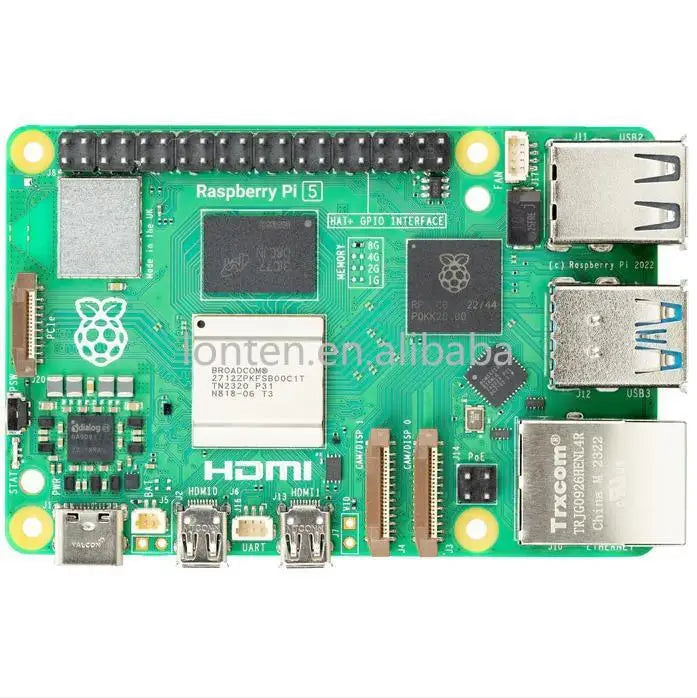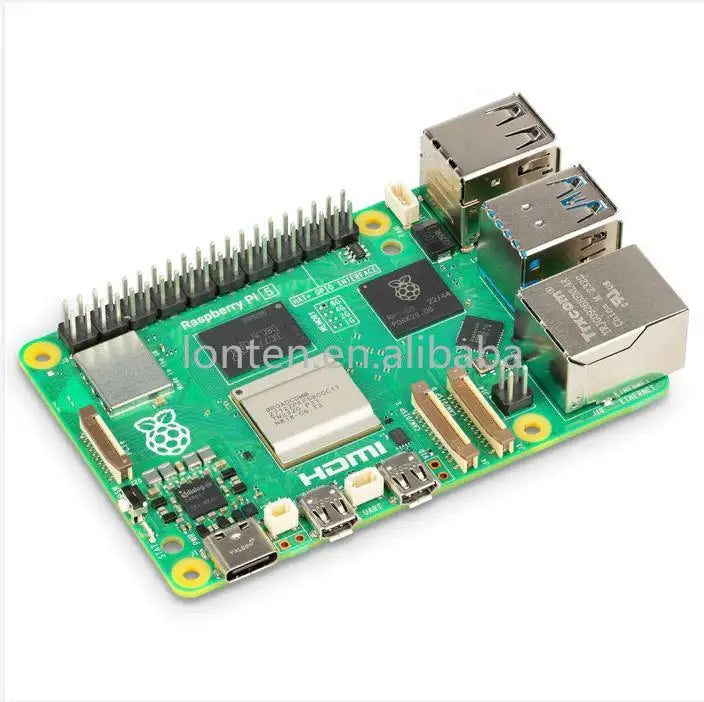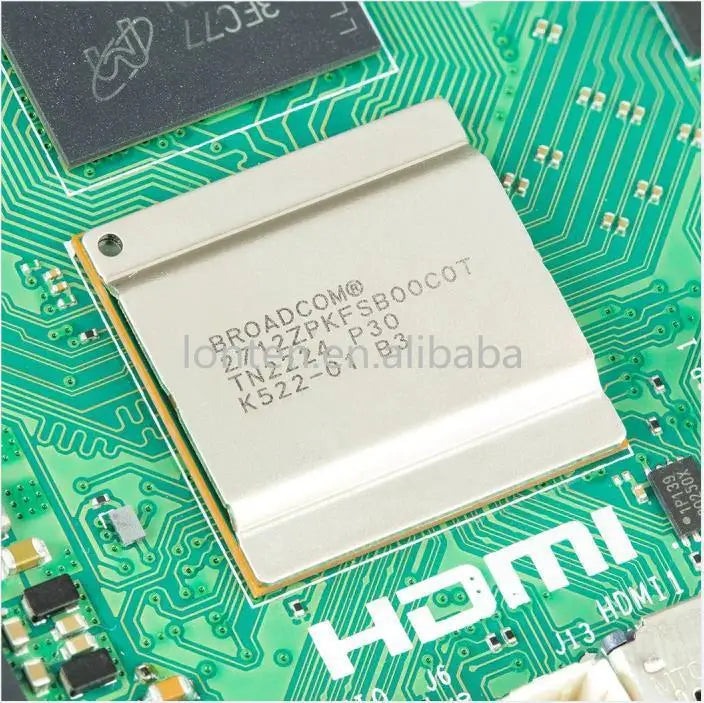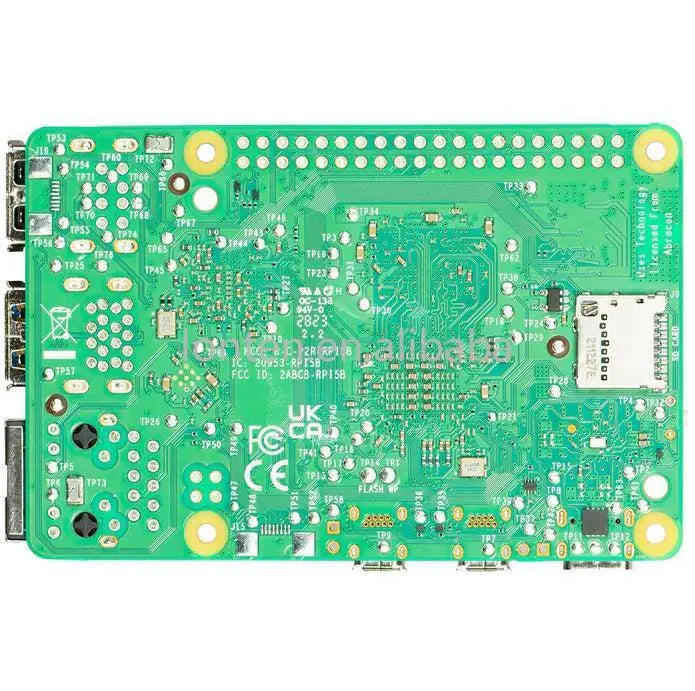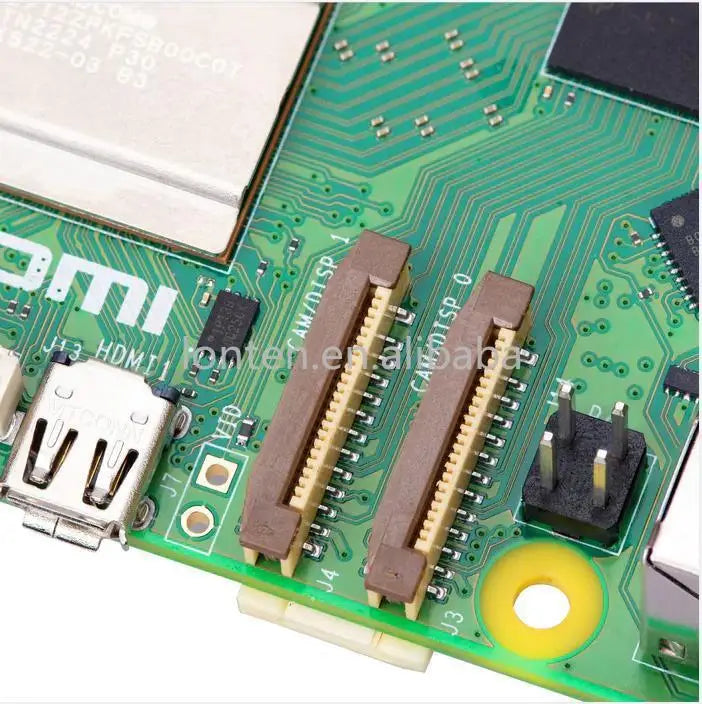1
/
of
5
Lonten Tech
Custom Newest Raspberry Pi 5B Raspberry Pi 5 Generation Development Board Arm Cortex-A76 Linux Development Board Manufacturer
Custom Newest Raspberry Pi 5B Raspberry Pi 5 Generation Development Board Arm Cortex-A76 Linux Development Board Manufacturer
Regular price
$100.00 USD
Regular price
$0.00 USD
Sale price
$100.00 USD
Unit price
/
per
Couldn't load pickup availability
2-3x CPU performance increase
The new 64-bit quad-core Arm Cortex-A76 processor at the heart of Raspberry Pi 5 runs at 2.4GHz with cryptography extensions, 512KB per-core L2 caches and a 2MB shared L3 cache.
This new Broadcom BCM2712 SoC (System on Chip) provides a 2-3x increase in performance over the previous generation of Raspberry Pi!
Improved graphics performance with dual 4Kp60 display output
Raspberry Pi 5 delivers a substantial uplift in graphics performance from the 800MHz VideoCore VII GPU, connected to the BCM2712 via PCI Express.
This allows Raspberry Pi 5 to offer full dual 4Kp60 display output via micro HDMI. These performance improvements provide a smooth desktop experience whilst browsing the internet and streaming videos.
Enhanced I/O capabilities including PCI-E!
For the first time, this is a full-size Raspberry Pi computer using silicon built in-house at Raspberry Pi.
The RP1 "southbridge" provides the bulk of the I/O capabilities for Raspberry Pi 5, and delivers a step change in peripheral performance and functionality.
Aggregate USB bandwidth is more than doubled, yielding faster transfer speeds to external UAS drives and other high-speed peripherals
Peak MicroSD card performance is doubled, through support for the SDR104 high-speed mode
Single-lane PCI Express 2.0 interface, providing support for high-bandwidth peripherals.
...including dual camera/display (CSI/DSI) ports!
The RP1 also delivers a pair of four-lane 1.5Gbps MIPI transceivers, tripling total bandwidth and enabling new dual CSI/DSI ports supporting any combination of up to two cameras or displays.
This, along with the image performance improvements from the rearchitected Raspberry Pi Image Signal Processor (ISP), opens your Raspberry Pi up to new project opportunities and huge improvements for those using Raspberry Pi 5 for commercial and industrial applications.
Power button (finally!)
Makers and enthusiasts have been asking for a dedicated onboard power button on the Raspberry Pi for as long as we can remember - and Raspberry Pi 5 finally delivers this much-requested convenience!
Real-time clock (RTC)
A real-time clock (RTC) is built into the board, allowing you to maintain time/date information even when you power off or aren't connected to the internet (when a backup battery is connected).
A dedicated header on the board has been added to allow the use of a backup battery for the RTC (battery available separately). A lithium battery with a compatible header will be available on, or shortly after, the launch of Raspberry Pi 5.
Dedicated fan header
Raspberry Pi 5 includes a new dedicated fan header to the right of the familiar GPIO pin header, allowing you to connect and run a cooling fan without interfering with your GPIO-connected devices. Now you can add HATs and other hardware without workarounds to connect a fan.
The official Raspberry Pi 5 case and Active Cooler use the JST fitting for this dedicated header.
Dedicated UART header
Another handy addition to Raspberry Pi 5 is the dedicated UART header. Now you can debug and control your Raspberry Pi 5 headlessly and without interfering with your GPIO pins.
This dedicated UART header also allows debugging from boot, and is designed to be used with the Raspberry Pi Debug probe for quick, convenient debugging.
Plus other improvements and changes
Mounting holes for coolers/heatsinks (designed for the Raspberry Pi Active Cooler)
Composite video header
Memory indication markers for easy board RAM identification
Unique board ID number on the board and packaging
Relocated PoE header
Audio jack removed
Flush(ish) underside to GPIO pins
Metal supporting tabs to protect components on the underside
Raspberry Pi 5 Specifications
Processor
2.4GHz quad-core 64-bit Arm Cortex-A76 CPU, with cryptography extensions
512KB per-core L2 caches
2MB shared L3 cache
Features
VideoCore VII GPU, supporting OpenGL ES 3.1, Vulkan 1.2
Dual 4Kp60 HDMI® display output with HDR support
4Kp60 HEVC decoder
LPDDR4X-4267 SDRAM (4GB and 8GB available at launch)
Dual-band 802.11ac Wi-Fi®
Bluetooth 5.0 / Bluetooth Low Energy (BLE)
MicroSD card slot, with support for high-speed SDR104 mode
2x USB 3.0 ports, supporting simultaneous 5Gbps operation
2x USB 2.0 ports
Gigabit Ethernet, with PoE+ support (requires separate Pi5-specific PoE+ HAT)
2x 4-lane MIPI camera/display transceivers
PCIe 2.0 x1 interface for fast peripherals (requires separate M.2 HAT or other adapter)
5V/5A DC power via USB-C, with Power Delivery support
Raspberry Pi standard 40-pin GPIO header
Real-time clock (RTC), powered from an external battery (available separately)
Power button
The new 64-bit quad-core Arm Cortex-A76 processor at the heart of Raspberry Pi 5 runs at 2.4GHz with cryptography extensions, 512KB per-core L2 caches and a 2MB shared L3 cache.
This new Broadcom BCM2712 SoC (System on Chip) provides a 2-3x increase in performance over the previous generation of Raspberry Pi!
Improved graphics performance with dual 4Kp60 display output
Raspberry Pi 5 delivers a substantial uplift in graphics performance from the 800MHz VideoCore VII GPU, connected to the BCM2712 via PCI Express.
This allows Raspberry Pi 5 to offer full dual 4Kp60 display output via micro HDMI. These performance improvements provide a smooth desktop experience whilst browsing the internet and streaming videos.
Enhanced I/O capabilities including PCI-E!
For the first time, this is a full-size Raspberry Pi computer using silicon built in-house at Raspberry Pi.
The RP1 "southbridge" provides the bulk of the I/O capabilities for Raspberry Pi 5, and delivers a step change in peripheral performance and functionality.
Aggregate USB bandwidth is more than doubled, yielding faster transfer speeds to external UAS drives and other high-speed peripherals
Peak MicroSD card performance is doubled, through support for the SDR104 high-speed mode
Single-lane PCI Express 2.0 interface, providing support for high-bandwidth peripherals.
...including dual camera/display (CSI/DSI) ports!
The RP1 also delivers a pair of four-lane 1.5Gbps MIPI transceivers, tripling total bandwidth and enabling new dual CSI/DSI ports supporting any combination of up to two cameras or displays.
This, along with the image performance improvements from the rearchitected Raspberry Pi Image Signal Processor (ISP), opens your Raspberry Pi up to new project opportunities and huge improvements for those using Raspberry Pi 5 for commercial and industrial applications.
Power button (finally!)
Makers and enthusiasts have been asking for a dedicated onboard power button on the Raspberry Pi for as long as we can remember - and Raspberry Pi 5 finally delivers this much-requested convenience!
Real-time clock (RTC)
A real-time clock (RTC) is built into the board, allowing you to maintain time/date information even when you power off or aren't connected to the internet (when a backup battery is connected).
A dedicated header on the board has been added to allow the use of a backup battery for the RTC (battery available separately). A lithium battery with a compatible header will be available on, or shortly after, the launch of Raspberry Pi 5.
Dedicated fan header
Raspberry Pi 5 includes a new dedicated fan header to the right of the familiar GPIO pin header, allowing you to connect and run a cooling fan without interfering with your GPIO-connected devices. Now you can add HATs and other hardware without workarounds to connect a fan.
The official Raspberry Pi 5 case and Active Cooler use the JST fitting for this dedicated header.
Dedicated UART header
Another handy addition to Raspberry Pi 5 is the dedicated UART header. Now you can debug and control your Raspberry Pi 5 headlessly and without interfering with your GPIO pins.
This dedicated UART header also allows debugging from boot, and is designed to be used with the Raspberry Pi Debug probe for quick, convenient debugging.
Plus other improvements and changes
Mounting holes for coolers/heatsinks (designed for the Raspberry Pi Active Cooler)
Composite video header
Memory indication markers for easy board RAM identification
Unique board ID number on the board and packaging
Relocated PoE header
Audio jack removed
Flush(ish) underside to GPIO pins
Metal supporting tabs to protect components on the underside
Raspberry Pi 5 Specifications
Processor
2.4GHz quad-core 64-bit Arm Cortex-A76 CPU, with cryptography extensions
512KB per-core L2 caches
2MB shared L3 cache
Features
VideoCore VII GPU, supporting OpenGL ES 3.1, Vulkan 1.2
Dual 4Kp60 HDMI® display output with HDR support
4Kp60 HEVC decoder
LPDDR4X-4267 SDRAM (4GB and 8GB available at launch)
Dual-band 802.11ac Wi-Fi®
Bluetooth 5.0 / Bluetooth Low Energy (BLE)
MicroSD card slot, with support for high-speed SDR104 mode
2x USB 3.0 ports, supporting simultaneous 5Gbps operation
2x USB 2.0 ports
Gigabit Ethernet, with PoE+ support (requires separate Pi5-specific PoE+ HAT)
2x 4-lane MIPI camera/display transceivers
PCIe 2.0 x1 interface for fast peripherals (requires separate M.2 HAT or other adapter)
5V/5A DC power via USB-C, with Power Delivery support
Raspberry Pi standard 40-pin GPIO header
Real-time clock (RTC), powered from an external battery (available separately)
Power button
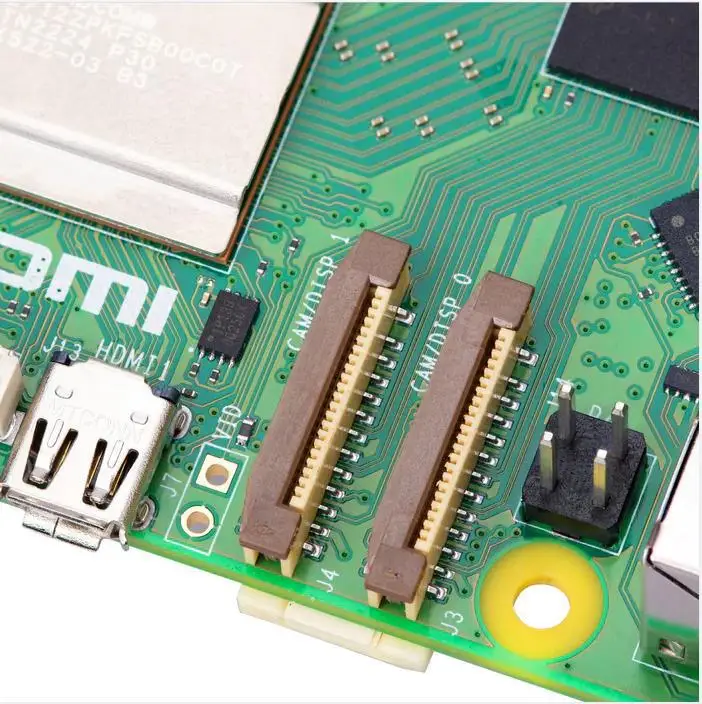
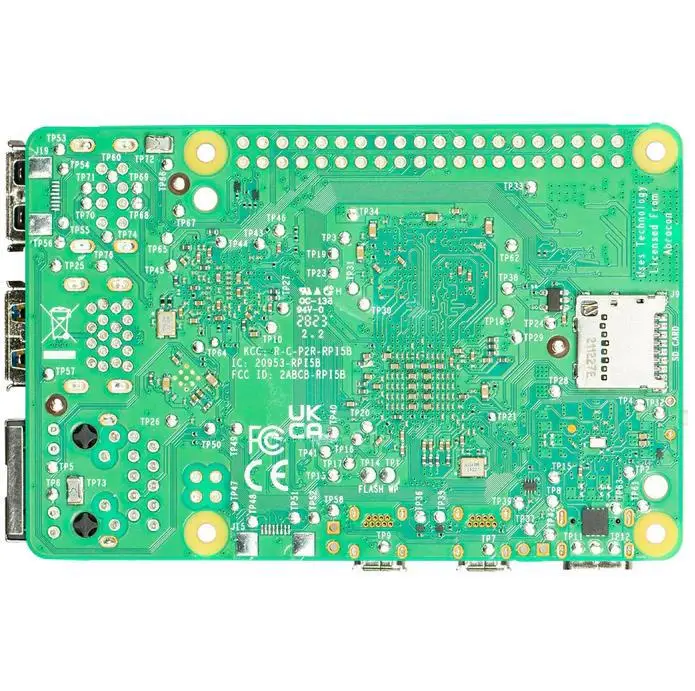
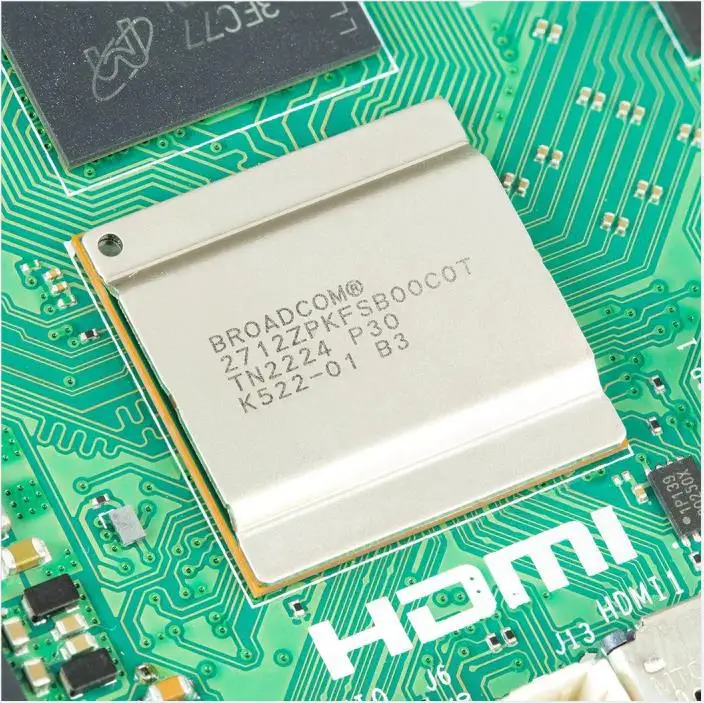
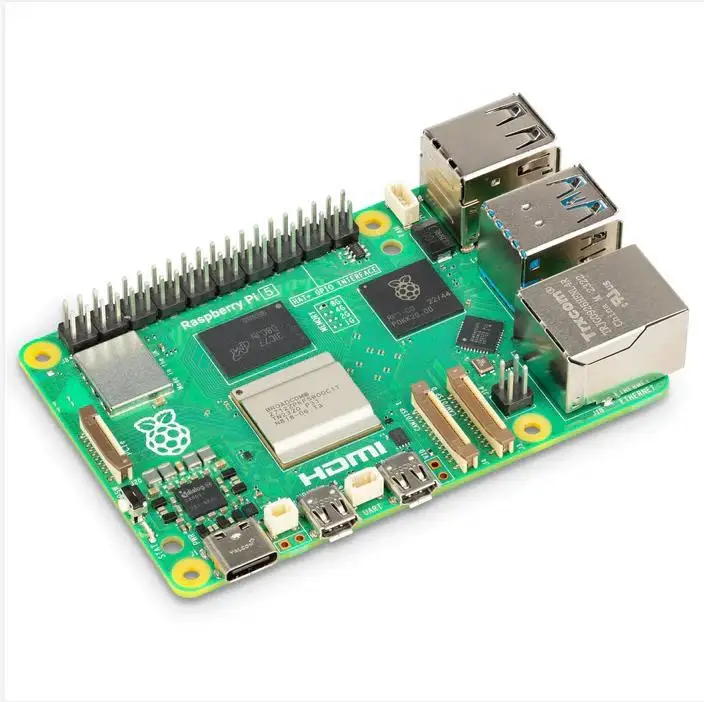
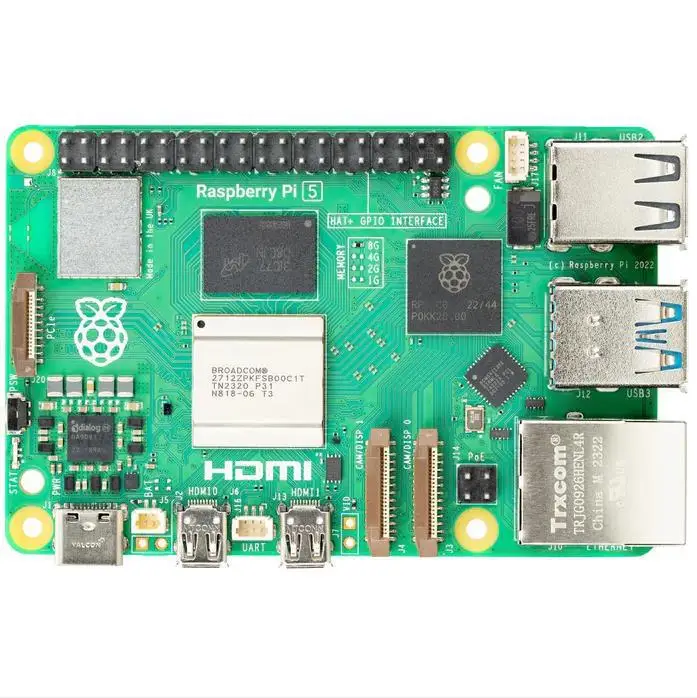
Share
